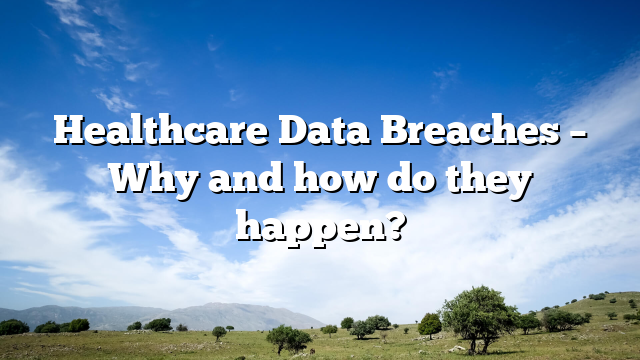Even though the novel coronavirus has been creating ruckus across the US healthcare system as well as the rest of the world, one thing is still occurring in full swing – healthcare data breaches. Why are they still occurring, what are the major causes, and why are they such nightmares for the US healthcare system?
Why do healthcare data breaches happen?
In a nutshell, HIPAA, or the Health Insurance Portability and Accountability Act, is being primarily used to ensure that sensitive patient data, known as protected health information (PHI), stays safeguarded from misuse or unauthorized usage, both internally and externally. HIPAA mandates that both the covered entities and business associates (the organizations who have to ensure HIPAA compliance) are ensuring enough safeguards while creating, maintaining, transmitting, and accessing PHI. This is quite crucial because, in the wrong hands, PHI can cause serious harm to the patients. One of the most common ways PHI is compromised is when a healthcare data breach occurs.
You might also like to read: 5 Effective Way to Manage Your Remote Team
But why do healthcare data breaches happen? They can be quite lucrative for hackers who aim to steal the data via data breaches. For instance, once they successfully gain access to computers and steal the data, they can sell it to the black market for large sums of money. This information can be used by the buyers to commit medical identity theft since they get access to the patients’ healthcare services.
Why are healthcare data breaches such a problem?
When a bad actor assumes the identity of the victim using the stolen data, it hampers the patient information in the process, as someone else’s information is recorded. The impostor’s medical history, allergies, medications, etc. are documented into the victim’s EHR, which itself can cause patient harm in the long run, cause financial troubles, and so on. Patients and healthcare providers spend long hours trying to fix such errors, which is undesirable for both parties. On top of that, not only will a healthcare data breach affect the reputation of the organization, but it will also be hit with a fine if a violation of HIPAA rules is detected – costing up to $1.5 million per year.
Common causes of healthcare data breaches
Over 171 healthcare data breaches occurred in 2020, affecting over 3.6 million people in the US, as per the HIPAA Breach Reporting Tool. According to the data, phishing attacks are the most common which causes data breaches, whereas the biggest breach this year so far was caused when unencrypted laptops were stolen.
Counting the significant data breaches recorded officially, 104 cases of hacking and IT-related mishaps affected 2.7 million people. The unencrypted laptops compromised over 654,000 people, the largest number in a single incident as of yet.
Other types of breaches occur, such as unauthorized access or disclosures by employees – 44 occurrences affected around 191,000 individuals in 2020.
Ensure HIPAA compliance to deal with data breaches
The best way to deal with data breaches is to avoid them from even happening. Only ensuring HIPAA compliance to the T can help you with – put all the safeguards in place and enforce them to keep PHI safe. The cases above showed that employees might not understand how much access they have, thus, providing ample training is also a must. Even though data breaches are inevitable, you can be on the safe side by following the HIPAA Breach Notification Rule in the case of a breach. Prior to that, ensure that you have followed all the rules and regulations.
As can be seen, HIPAA compliance can be quite cumbersome, time-consuming, and complex, since it has a lot of intricate rules. Reduce the administrative burden with HIPAAReady – a HIPAA compliance software that was designed to simplify compliance management. Do that by conducting internal audits to find out vulnerabilities, ensuring training management and scheduling them, and keeping everyone on the same page regarding HIPAA information by storing everything in a centralized location.
